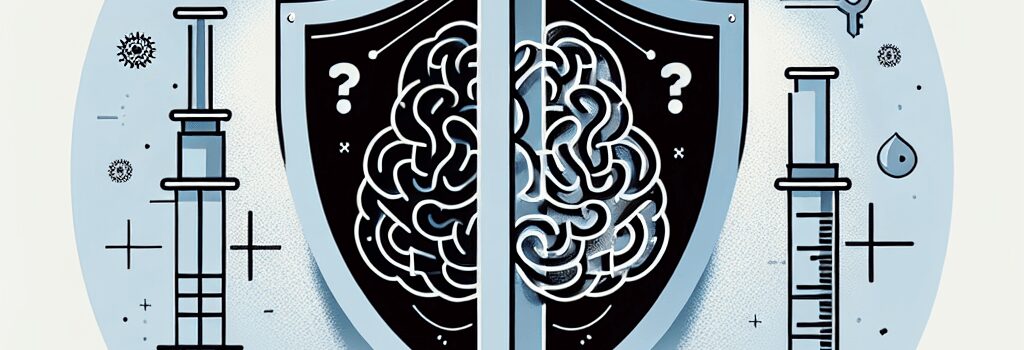Could the Shingles Vaccine Offer an Unexpected Shield Against Dementia?

Study Overview and Breakthrough Findings
A recent study leveraging data from NHS Wales has revealed a surprising bonus benefit of the live-attenuated varicella zoster vaccine. Originally developed to reduce the painful symptoms of shingles, the vaccine has now been linked to a statistically significant decrease in the incidence of dementia. Researchers capitalized on a natural experiment created by a strict age eligibility cutoff—individuals born on or after September 2, 1933, were eligible, while those born earlier were not. This clear demarcation allowed for a quasi-randomized comparison between virtually identical cohorts, isolating the effect of the vaccine on long-term neurological outcomes.
Technical Analysis of the Study Design
The strength of this research lies in its sophisticated epidemiological methodology. The observational study mirrored a regression discontinuity design, taking advantage of the age cutoff to compare population segments that were nearly identical in health status, healthcare utilization, and socio-demographic factors. Key points include:
- Natural Experiment Framework: The nearly identical cohorts separated by a narrow time window ensured that confounding variables were minimized, thus enhancing the reliability of the observed association between vaccine eligibility and reduced dementia diagnoses.
- Statistical Rigor: Difference-in-difference analyses confirmed the robustness of the results. With only 0.01 percent of the ineligible group having been vaccinated compared to nearly 50 percent of the eligible group, the observed absolute risk reduction of 1.3 percent (equating to an 8.5 percent relative risk reduction) becomes even more impressive when adjusted for partial vaccination uptake—yielding an estimated 20 percent reduction in relative risk.
- Control Analyses: The research team meticulously controlled for healthcare access variability, ensuring that the differences in dementia diagnoses were not simply an artifact of differing frequencies of medical consultations.
Unpacking the Biological Mechanisms
While the epidemiological data presents a strong case for the vaccine’s protective effect, the study also delves into possible biological explanations. Three primary hypotheses have emerged:
- Direct Viral Suppression: As the vaccine curtails the reactivation of the varicella zoster virus, it may reduce the viral-induced neuroinflammation linked to the onset of dementia.
- Immune Modulation: The vaccine might alter immune system dynamics. Given that an overactive immune response is implicated in various neurodegenerative processes, subtle shifts in immune profiles could reduce the risk of neurodegeneration.
- Indirect Healthcare Effects: A less frequently considered pathway is that individuals receiving treatment for active shingles may face an increased risk of dementia diagnosis due to heightened medical surveillance, an effect seemingly mitigated by vaccination.
Further supporting these theories, the study noted that patients experiencing multiple shingles episodes were at greater risk for dementia, while those treated with antiviral medications showed a lower incidence of subsequent neurological decline.
Expert Opinions and Future Directions
Leading epidemiologists and neurologists have lauded the methodological rigor of the study. Dr. Emily Roberts, an expert in infectious diseases, commented, “This work not only reinforces the vaccine’s role in preventive medicine but also opens the door to exploring how immune modulation might play a part in preventing neurodegenerative diseases.” Meanwhile, biostatisticians underscore the importance of robust natural experiments in cases where randomized clinical trials are impractical given the decades-long latency of dementia.
Ongoing research will likely focus on:
- Identifying the specific immune pathways altered by the vaccine.
- Dissecting the differential impact on various forms of dementia, including Alzheimer’s disease.
- Exploring similar protective correlations with other vaccines that target latent viral infections.
Implications for Public Health Policy and Advanced Data Analytics
This emerging evidence has important consequences for public health strategies. The study’s use of extensive, high-quality patient data from NHS Wales exemplifies the growing role of big data analytics in healthcare decision-making, a field that increasingly intersects with advances in artificial intelligence and cloud computing. Modern data platforms allow for the aggregation and real-time analysis of vast healthcare datasets, enabling early detection of patterns that might be missed in smaller studies.
Policy makers and health authorities can leverage these findings to re-evaluate vaccination strategies, especially given that the varicella zoster vaccine’s dual benefits address both acute infectious and long-term neurodegenerative risks. The study reinforces the idea that proactive immunization strategies can yield dividends far beyond their immediate targets, underscoring the value of integrating advanced data-driven techniques into public health planning.
Deeper Analysis: Bridging Technology and Medical Research
The convergence of healthcare and advanced computational techniques is ushering in a new era of medical research. Here, machine learning algorithms and cloud-based infrastructures are being utilized to sift through enormous amounts of clinical data, pinpointing subtle correlations that might indicate protective effects or risk factors associated with various treatments. The seamless integration of clinical trial data with observational studies, as demonstrated in the Welsh study, is only one instance of how modern technology is enhancing our understanding of complex diseases like dementia.
Concluding Observations
In summary, the research provides encouraging evidence that a vaccine originally intended to mitigate the debilitating effects of shingles could also play a significant role in reducing the risk of dementia. Given the aging global population and the corresponding increase in dementia cases, these findings are particularly timely. As the healthcare sector continues to harness the power of artificial intelligence and big data, further investigations will be critical in unwrapping the precise biological and immunological underpinnings of this association. In the meantime, the robust data supports the broader adoption of the shingles vaccine as a tool for both immediate and long-term public health benefits.
Source: Ars Technica